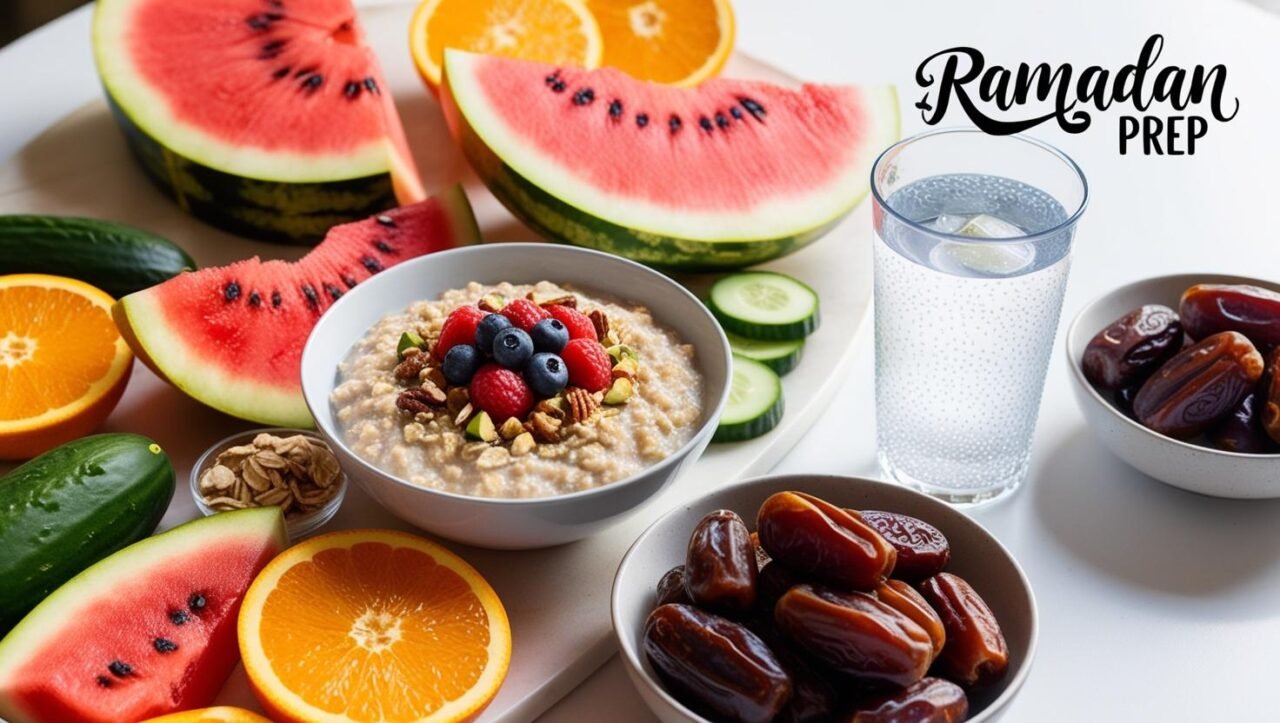Why Nutrition Matters Before Ramadan

Ramadan is a time of spiritual growth, self-discipline, and fasting. But without the right preparation, many people struggle with fatigue, headaches, and low energy. The good news? What you eat in can help your body adapt, making fasting easier and keeping your energy levels steady.
By focusing on nutrient-dense foods, hydration, and balanced meals, you can boost energy, prevent muscle loss, and maintain good digestion before Ramadan begins.
Key Nutrients to Focus On
To prepare for Ramadan, your body needs a mix of slow-digesting carbs, lean proteins, healthy fats, and essential vitamins. Here’s what to prioritize:
- Complex Carbohydrates for Long-Lasting Energy
Carbs are your body’s main fuel source. The right kind will boost energy and prevent sugar crashes.
✅ Best Choices:
- Oats, quinoa, brown rice
- Whole wheat bread, sweet potatoes
- Lentils, beans, and chickpeas
❌ Avoid: Refined carbs like white bread, pastries, and sugary cereals.
💡 Tip: Eat complex carbs at breakfast to stabilize energy levels throughout the day.
- Protein for Strength and Recovery
During Ramadan, long fasting hours can lead to muscle loss. To prevent this, start increasing your protein intake now.
✅ Best Choices:
- Chicken, turkey, and fish
- Eggs and Greek yogurt
- Nuts, seeds, and tofu
💡 Tip: Combine protein + healthy fats (like almonds and yogurt) for a steady energy release.
- Healthy Fats for Sustained Energy
Fats keep you full longer and provide a steady energy supply.
✅ Best Choices:
- Avocados and olive oil
- Nuts and seeds
- Fatty fish (like salmon)
❌ Avoid: Fried foods and trans fats, as they cause bloating and sluggishness.
💡 Tip: Add a tablespoon of olive oil to your meals for heart-healthy benefits.
- Hydrating Foods for Better Digestion
Many people struggle with dehydration during fasting, leading to headaches and fatigue. Start drinking more water in February and eat foods with high water content.
✅ Best Choices:
- Cucumbers, watermelon, oranges
- Yogurt and soups
- Herbal teas
💡 Tip: Drink at least 2 liters of water daily to prevent dehydration in Ramadan.
A Sample Meal Plan
Here’s how you can boost energy with the right food choices:
🥣 Breakfast: Oatmeal with nuts & berries + Greek yogurt
🍽️ Lunch: Grilled chicken with quinoa & roasted veggies
🥗 Dinner: Lentil soup with whole wheat bread + a side of avocado salad
🍎 Snacks: Dates, hummus with carrots, or a handful of almonds
Common FAQs
Q: Should I start fasting in February to prepare for Ramadan?
✅ Yes! Fasting once or twice a week helps your body adapt gradually to long fasting hours.
Q: Can I still drink coffee?
☕ Yes, but limit it. Too much caffeine causes dehydration. Try switching to herbal teas.
Q: How do I avoid sugar cravings?
🍫 Eat complex carbs and protein-rich snacks to stabilize blood sugar levels.
Final Thoughts: Start Preparing Now!
February is the perfect time to boost energy and prepare your body for Ramadan. By focusing on balanced meals, hydration, and key nutrients, you’ll enter Ramadan feeling strong and energized.
Want personalized guidance? I, Souad Gharib, can help you create a custom nutrition and fitness plan for Ramadan! Check out my coaching services here. 💪
